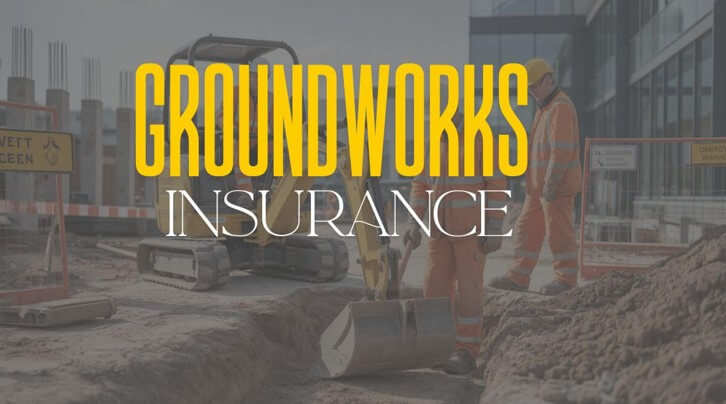Groundworks Insurance: Essential Protection for Contractors and Tradespeople

Working in groundworks is demanding, risky, and highly specialised. From site clearance and drainage to foundations and underpinning, groundworkers operate in challenging environments every day. With heavy machinery, excavation, underground utilities, and hazardous conditions, even the most experienced professional faces potential accidents and unexpected losses. That is where groundworks insurance comes in — offering financial protection, legal compliance, and peace of mind.
What Is Groundworks Insurance?
Groundworks insurance is a tailored insurance solution designed specifically for groundworkers and contractors in related trades. Unlike generic business policies, it addresses the unique risks of excavation, site preparation, drainage, foundation installation, and similar activities.
At its core, it includes public liability insurance to cover accidental injury or property damage claims from third parties. However, most contractors require additional layers such as employers’ liability, tools and plant cover, contract works insurance, and professional indemnity.
Why Groundworkers Need Insurance
Groundworkers face a higher risk profile than many other trades. Common hazards include:
- Injuries to the public – A pedestrian could trip over open trenches or be struck by machinery.
- Employee accidents – Groundwork involves manual labour, deep excavations, and plant operation, all of which present health and safety risks.
- Damage to property – Striking a water pipe, gas main, or telecom cable can lead to costly claims.
- Environmental hazards – Excavation can disturb contaminated soil or cause pollution incidents.
- Theft and vandalism – Tools, machinery, and plant left on site are attractive to thieves.
- Contractual obligations – Developers, main contractors, and local councils often require proof of insurance before work can begin.
Without insurance, even a single claim could bankrupt a small business.
Core Covers in Groundworks Insurance
Public Liability Insurance
This is the foundation of any groundworks policy. It protects against claims for injury or property damage made by members of the public, clients, or other contractors. For example, if a digger accidentally damages a neighbouring property, the costs would be covered.
Typical cover limits range from £1 million to £10 million, depending on contract requirements.
Employers’ Liability Insurance
If you employ staff, UK law requires a minimum of £5 million employers’ liability cover. This protects against compensation claims if an employee is injured or becomes ill due to work. Groundworks is a high-risk sector, so this cover is essential.
Contract Works Insurance
Also known as builders’ risk insurance, this covers work in progress against damage from fire, theft, flood, or vandalism. For example, if heavy rain causes a trench collapse after weeks of preparation, contract works insurance can help recover the costs.
Plant, Tools, and Equipment Insurance
Groundworkers depend on expensive plant such as diggers, dumpers, and drills. Plant cover can protect both owned and hired-in machinery. Tools insurance covers theft or damage to smaller equipment.
Professional Indemnity Insurance
If you provide design, consultancy, or project planning services, professional indemnity protects you against claims arising from professional mistakes or negligent advice.
Motor and Fleet Insurance
Commercial vehicles, vans, and lorries used to transport tools, machinery, and staff need specialist cover. Fleet insurance can be more cost-effective if you operate several vehicles.
Optional Covers
- Personal accident insurance – Provides income support if you or an employee cannot work due to injury.
- Environmental liability – Covers the cost of cleaning up accidental pollution or contamination.
- Business interruption cover – Protects income if operations are halted by insured events.
Risks Unique to Groundworks
The groundworks sector is particularly exposed to risks that may not apply to other trades:
- Underground services – Hitting a gas main or electrical cable can cause serious injury, disruption, and large compensation claims.
- Excavation collapse – Trenches and foundations can collapse, endangering workers and equipment.
- Depth restrictions – Many insurers set limits on how deep you can excavate without special cover.
- Working with heavy plant – The use of diggers, dumpers, and compactors carries higher liability risks.
- Weather dependence – Heavy rain, flooding, or frost can damage works in progress.
- High-value equipment – Plant and tools are often targeted by organised theft.
A well-structured groundworks insurance policy ensures these risks are managed.
Legal and Contractual Requirements
- Employers’ Liability is a legal requirement if you employ anyone.
- Public Liability is not legally mandatory but almost always required by contracts and local authorities.
- Proof of Insurance (certificate of insurance) is usually demanded before being allowed on site.
- Minimum Cover Limits may be dictated by clients (e.g., £5 million public liability for council contracts).
Failure to carry appropriate cover can lead to contract loss, penalties, or legal action.
How Much Does Groundworks Insurance Cost?
Premiums vary depending on:
- Size of business (turnover and payroll).
- Number of employees and subcontractors.
- Nature of work (depth of excavation, underpinning, demolition).
- Value of tools and plant.
- Claims history.
- Required levels of cover.
A sole trader groundworker may pay from around £20–£50 per month for basic liability cover, while larger firms operating heavy plant could see premiums in the thousands annually.
How to Choose the Right Policy
- Assess Your Risks
Consider the type of work you undertake, depth of excavation, and whether you own or hire machinery. - Check Contract Requirements
Always match your insurance limits to those required by clients. - Work with a Specialist Broker
Brokers experienced in construction and groundworks can tailor policies and highlight exclusions such as depth limits. - Review Exclusions Carefully
Common exclusions include asbestos, work near railways, or excavations beyond a set depth. Ensure your work activities are covered. - Update Regularly
As your business grows, payroll, turnover, and plant values will change. Keep your policy up to date to avoid underinsurance.
Benefits of Groundworks Insurance
- Financial protection – Prevents catastrophic losses from claims or damage.
- Legal compliance – Employers’ liability is a legal requirement.
- Professional credibility – Demonstrates responsibility and reliability to clients.
- Peace of mind – Allows you to focus on work rather than worrying about potential risks.
- Business continuity – Ensures projects and income are protected even after setbacks.
Case Examples
Example 1: Public Liability Claim
A groundworker operating a digger accidentally hits a water main, flooding a nearby property. The resulting damage and repair costs exceed £50,000. Public liability insurance covers the claim, saving the business from bankruptcy.
Example 2: Employee Injury
A worker falls into an unsecured trench and suffers a serious injury. Employers’ liability covers medical expenses and compensation, ensuring compliance with legal obligations.
Example 3: Plant Theft
Thieves steal a hired excavator from a site overnight. Plant insurance pays for the replacement cost, preventing the business from having to cover it personally.
Tips for Reducing Premiums
- Demonstrate strong health and safety practices – Insurers reward businesses with fewer claims.
- Secure equipment – Use immobilisers, locks, and CCTV on sites.
- Bundle covers – Combine liability, plant, and contract works under one policy for discounts.
- Compare quotes annually – Insurance markets change; shopping around can reduce costs.
- Limit subcontractor exposure – High reliance on uninsured subcontractors can raise premiums.
Conclusion
Groundworks is one of the most critical yet risky aspects of construction. With risks ranging from public liability claims and employee injuries to plant theft and environmental damage, operating without proper cover is simply not an option.
A comprehensive groundworks insurance policy provides essential protection, ensures legal compliance, and builds confidence with clients. By carefully selecting the right mix of liability, employers’ cover, contract works, and plant insurance, contractors can safeguard their livelihoods and concentrate on delivering high-quality work.



